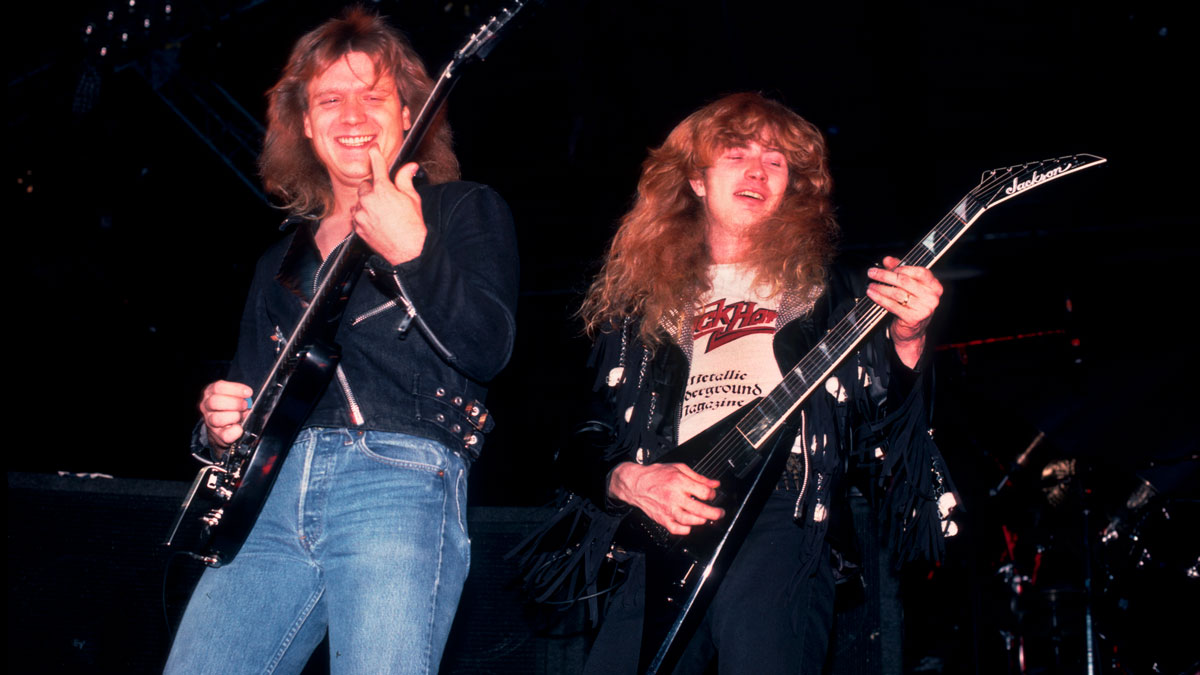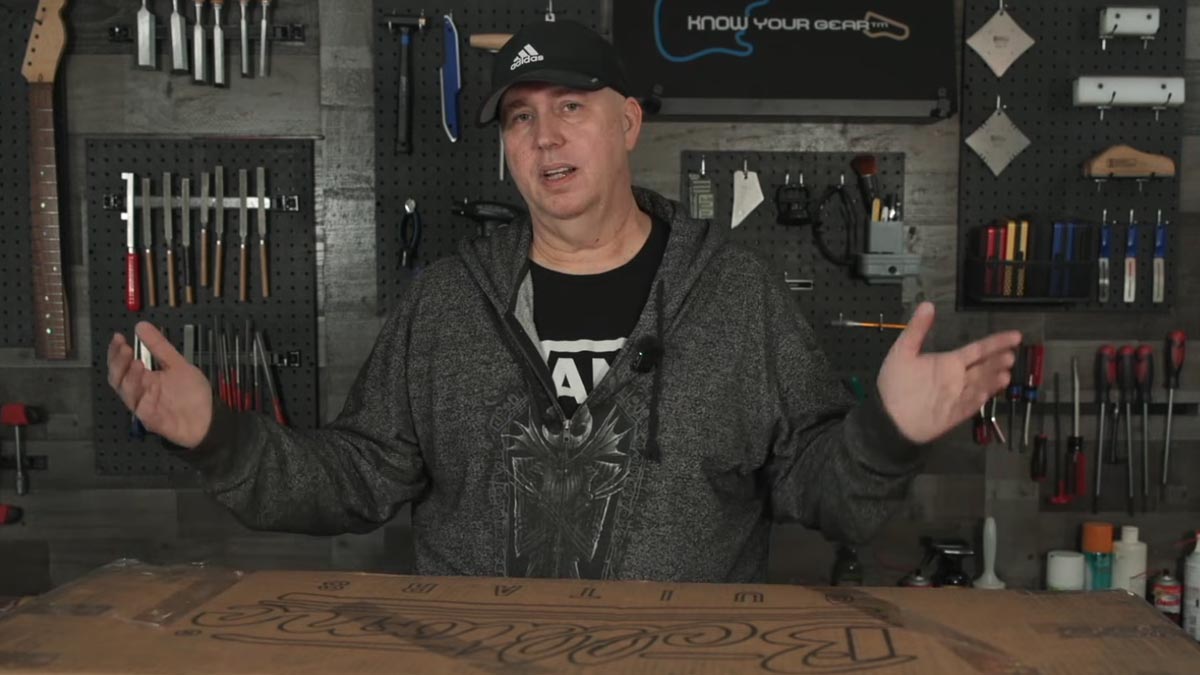"I don't even own a Strat! I used my Dean Thoroughbred, a far cry from what David Gilmour used": How ex-Megadeth guitarist Chris Poland ended up covering Pink Floyd
Dave Mustaine's former right-hand man was surprised to find himself tackling Floyd's San Tropez, but it's the perfect showcase for his flexible chops. He explains his approach to playing Gilmour's leads, what he thinks of Megadeth's latest material, and why he was "so bummed out" when he first heard Peace Sells…

Given he made his name as the lead guitarist for Megadeth from 1984-87, the idea that Chris Poland would lend his talents to a recently re-recorded version of Pink Floyd's 1971 record Meddle seems more than a touch off the beaten path.
But then again, Poland "never was a straight thrash player", by his own admission, and his improvisational skills are a sight to behold.
"The funny thing is that I'd never even heard Meddle before," Poland laughs. "So, I was kind of surprised when Cleopatra Records asked me to come aboard to play guitar on San Tropez, but it turned out great."
The track – on which Poland appears alongside an all-star cast, including Dave Lombardo, Rick Wakeman, Graham Bonnet and Joe Bouchard – sees the lead guitarist showcase his tasteful lead chops, not to mention some deft slide licks.
Given his skillset, which lends itself as well to fusion and prog as it does thrash metal, one has to wonder if Pink Floyd six-stringer David Gilmour, a bringer of all things expansive and unique, was an influence on Poland as he was coming up in the ranks.
"That's a good question," Poland says. "Yeah… David was an influence on me, for sure. Fans might not know it because of my work with Megadeth, but I've always been into fusion. So much so that I actually consider myself that type of guitarist; I've just always found myself playing metal. But as far as Gilmour goes, man, I just love his tone. He can do more with three notes than most guys can with a million."
Given his influence, the next question that comes to mind is how Poland approached a solo that, to some extent, is considered near-perfect, as with most of Gilmour's lofty compositions. Of course, Poland knows this, and he took great care in his execution.
All the latest guitar news, interviews, lessons, reviews, deals and more, direct to your inbox!
"When I first started trying to do the solo, I realized that I couldn't have too much gain because it just would sound ridiculous," Poland recalls. "So, I dialed back the gain and tried not to go too far beyond the core changes, which led me to what I played. The whole thing was pretty much off-the-cuff and very in the moment."
Of course, the odds are that Gilmour used his trusty Strat when recording the original solo back in '71. Poland admits his choices differed somewhat.
"I don't even own a Strat!" he laughs. "I used my Dean Thoroughbred, a far cry from what Gilmour used [laughs]. But now that I think about it… maybe I do own a Strat. I think it's buried under like 10 guitar cases. I certainly wasn't going to dig that out."
After years of heavy metal mayhem, assuming Poland is an interesting juxtaposition on a track like San Tropez is not a stretch. But that's the point of the recording: to inspire and do something different. It's precisely the sort of thing that made David Gilmour famous with Pink Floyd in the '70s, and it's just what inspired Poland during his entry point into the Floyd universe.
I used to improvise the Wake Up Dead solo while I was in Megadeth. Dave hated it. He used to get so upset, and that was fair. I shouldn't have done that
Chuckling again at the idea that he'd be included on a Pink Floyd reimagining, Poland says, "No, I never thought I'd be a part of something like this. And, like I said, I'd never really listened to Meddle, so it's all new to me. But I still haven't listened to it [laughs]. But I plan to grab a copy and listen to it… eventually. But from what I gather, it was pretty trippy and definitely different from what I've done with Megadeth."
It's a good point and about as poignant as ever considering Poland's recent reemergence alongside fellow Megadeth castoffs David Ellefson and Jeff Young with Kings of Thrash, which has seen Poland – long a forgotten man on the totem pole of thrash – find a new audience in recent years.
"It's been a lot of fun," Poland enthuses. "It's been interesting getting together with those guys and playing those tunes again. I was worried I might have forgotten how to play them, but to my surprise, after a few times playing them, all my muscle memory returned."
He continues, "I was like, 'Holy cow! I can still do this after all these years!' But take the Wake Up Dead solo, for instance; I'm very proud of that solo, and I know many people liked it. It's only like 10 seconds long, but I didn't want to improvise it, which is something I did while I was in Megadeth that Dave hated. He used to get so upset, and that was fair. I shouldn't have done that. But anyway, I really took the time to actually learn the solo, and I was happy that I still could."
Given his status as a cult hero, combined with the fact that Megadeth's early records are considered classics, the idea that Dave Mustaine "hated" anything that Poland did is hard to believe, while not being altogether shocking all in the same breath.
And so, while improvisation might not have been preferred in the case of Poland, the fact remains that it was part of the method within his madness.
I came from a different place than Dave. But I guess that was the beauty of our incarnation of Megadeth. The differing opinions probably made the music as good as it was
"Yeah, I guess that's true," he agrees. "I came from a different place than Dave. But I guess that was the beauty of our incarnation of Megadeth. The differing opinions probably made the music as good as it was."
It's a fair point, as many feel that Poland's era of Megadeth remains the definitive version. When asked if he agrees with that notion and if the current incarnation measures up, he tells us, "Honestly, I pretty much like all of what Megadeth has done."
Pausing to think before continuing, Poland says, "Well, I wasn't that into the Risk album, but Dystopia from a few years ago was incredible. That was a really good Megadeth record. And I liked the new album, too. But as far as the albums I was part of, while I didn't realize it then, yeah, those albums were special. It was a special time, and I think it was meant to happen as it did."
Unlike many – if not most – of those who have come and gone through Megadeth's ranks, despite his past troubles with Mustaine, Poland seems relatively at ease when talking about his former bandmate and boss.
"I try not to think about what went down," Poland admits. "I know that Dave got upset with me over some stuff that happened years ago, but to me, it wasn't really anything to be upset about. But what can I do? People get upset."

It would be easy to look back in anger or wish things were different, but Poland chooses to bask in the glow that his years in Megadeth have afforded him, despite what the public may think.
"People think I'm angry about what happened, but I'm not," Poland insists. "I look back on what we did with a lot of fondness. And as far as the guitar goes, I'm a better player now. My instincts are sharper. But I still do what I've always done – fly by the seat of my pants [laughs]. And, yeah, I still sometimes struggle to re-learn things. But, man, I can't even begin to tell you how proud I am of those Megadeth records and how humbled I am to have been a part of it all."
Pausing and clearly choosing his words carefully, he continues, "I mean… Peace Sells… [But Who's Buying?] was a serious record, dude. It was a serious record; I didn't even know it until years later. When I first heard the mix, all I could do was compare it to Metallica's Master of Puppets, and I was so bummed out. I never listened to it again after that."
He concludes, "But then it got remastered years later, and I went back and listened, and that's when I realized I'd been a part of a genius record. So, all credit to Dave Mustaine; he probably knew. To me, we were just playing music. I had no idea I was going to be part of something iconic. But I'm glad I was."
Andrew Daly is an iced-coffee-addicted, oddball Telecaster-playing, alfredo pasta-loving journalist from Long Island, NY, who, in addition to being a contributing writer for Guitar World, scribes for Bass Player, Guitar Player, Guitarist, and MusicRadar. Andrew has interviewed favorites like Ace Frehley, Johnny Marr, Vito Bratta, Bruce Kulick, Joe Perry, Brad Whitford, Tom Morello, Rich Robinson, and Paul Stanley, while his all-time favorite (rhythm player), Keith Richards, continues to elude him.

